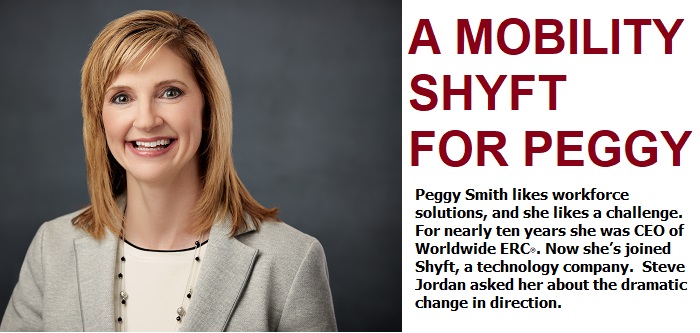Peggy Smith likes workforce solutions, and she likes a challenge. For nearly ten years she was CEO of Worldwide ERC®. Now she’s joined Shyft, a technology company. Steve Jordan asked her about the dramatic change in direction.

For the last decade Peggy Smith has been stationed at the epicentre of relocation, heading up the Worldwide ERC®. Prior to that role, she ran the global mobility programme for Microsoft and was simultaneously a member of the Worldwide ERC® Board of Directors. Over time, she has epitomised relocation in all its forms. So why the change? What was so attractive about Shyft, an emerging organisation?
“I'd been wrapping up the end of a three-year strategic plan with Worldwide ERC® and was looking for the next hill to climb: something that would build new skills and present a challenge,” Peggy explained. “I've always had a fondness for the household goods component of relocation, and I love the speed, scrappiness and potential of start-up environments. Shyft had the right combination of everything I wanted.“
Peggy joined Shyft in January. It’s a company that has grown from what started out as Crater, one of the pioneers of virtual surveys. I asked Peggy how she would describe Shyft. “We are a technology-driven platform that helps individuals and organisations support the live-and-work-anywhere revolution. We’re rooted in tech, but we’re human to the core! And because we recognise that today’s talent is very fluid, we want to help jobseekers and employees decide where and when they want to work,” she said.
She explained that the users of virtual survey technology were increasingly looking for the company to perform the survey for them, not just supply the technology. This gave Alex Alpert, the company’s founder, an idea.
Shyft moved away from providing just the software for virtual surveys into conducting the survey themselves. The process: Shyft receives details of assignees from corporations or relocation management companies (RMCs) and immediately makes contact, performs the survey, has it approved by the client and puts it on the Shyft moveboard to make it available to moving companies. “The movers provide the quotes and Shyft books the moves for them,” Peggy explained. “We’re serving people who are currently underserved and executing moves that might not be economically feasible for some organisations.”
But it’s much more than just moving. “Alex realised that not everyone with a lump sum from their company wants to spend it all on household goods moving. And if this is their first move – or their first lump-sum experience - they likely need a little guidance and support. So why not provide other services to them as well?” she said.
So, while talking to the assignee, Shyft now performs a needs assessment and offers a wide range of appropriate services to help them relocate and settle into their new environment. “This might include such services as helping them find a roommate or a dog walker, get a driving licence or help in connecting utilities.” Peggy said that all the services are coordinated by Shyft and provided by suppliers. The company is not an RMC and has no intention of becoming one. It doesn’t, for example, get involved with tax or real estate.
The company has grown energetically already and is revving up for even more expansion. It has 45 in-house developers, has received $15m in funding and has bought a building in Belgrade that can house up to 1000 people. Shyft clearly has a big vision; one they want to share with moving companies and other service suppliers who would like to be part of this potential revolution in the way services are delivered. “This is transformation in a very real sense,” said Peggy. “We are talking to moving companies and we’re open to exploring innovative connections with folks who want to have a conversation with us. We’re building appeal to the budget-conscious person and exploding the perception that people who are on a ‘cash out’ option will be satisfied with a mediocre experience. They deserve a great one! And some will want a full-service move. This brings moving companies into a market that wouldn't otherwise be available to them.”
It’s early days for Peggy at Shyft and she has spent much of her time securing relationships and helping the industry understand what Shyft is and what it is not. “We’re looking toward the future,” she said. “It will be determined by how employment models develop and whether the current trend for talent fluidity continues. If it does, it’s our job to help those people get to where they want to be.”
I have written in The Mover about disruptive technology and when and where it might appear. Is this an evolution or a revolution? I don’t know. But it is part of a much greater trend, a trend that is seeing the relationship between customer and mover change. In my opinion, moving companies reading this article ignore this at their peril.
Photo: Peggy Smith.